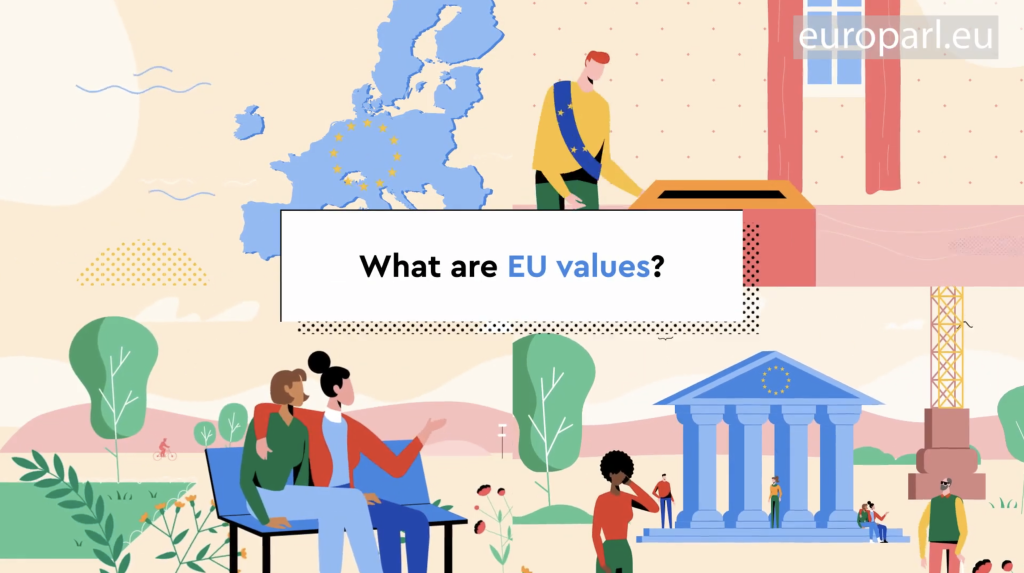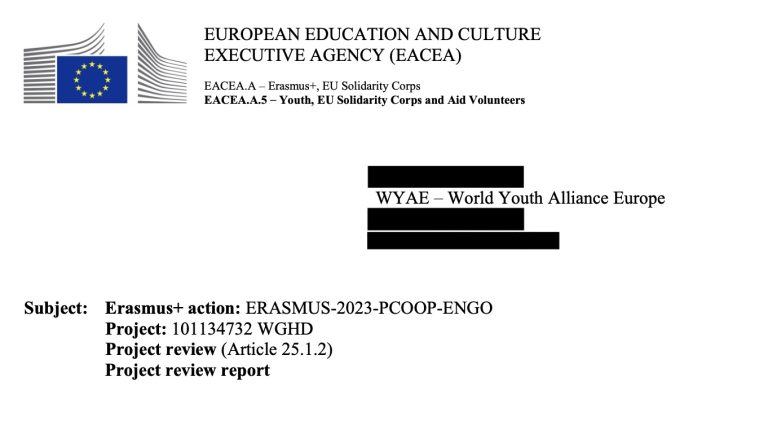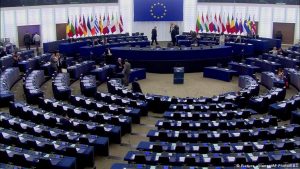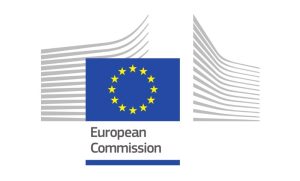At the beginning of November 2025, World Youth Alliance Europe received 3 project review letters from the European Education and Culture Executive Agency (EACEA) concerning Erasmus+ grants awarded to World Youth Alliance Europe and World Youth Alliance South-East Europe for projects that had been executed starting in January 2024.
The projects concerned are called Women’s Health Goes Digital (WHGD), Youth Act 2024 (YA2024) and WYA Europe Operating grant 2024 (OG2024), respectively. All three reports arrive at the same conclusions and are built “on the reports of the two experts contracted to carry out the technical review: Prof. Marie-Geneviève Pinsart, Université Libre de Bruxelles and Prof. Emily-Meg Jackson, London School of Economics.”
Across all three letters, EACEA presents the same core claim, applied to the three different grant agreements, that WYA Europe with its project implementation does not fully uphold the EU values required under Article 14.2 of the Grant Agreement.
Article 14.2 of the Grant Agreement specifies that ‘the beneficiaries must commit to and ensure the respect of basic EU values. The referenced basic EU values are provided in Article 2 of the Treaty of the Union (2016/C 202/01): ‘The Union is founded on the values of respect for human dignity, freedom, democracy, equality, the rule of law and respect for human rights, including the rights of persons belonging to minorities. These values are common to the Member States in a society in which pluralism, non-discrimination, tolerance, justice, solidarity and equality between women and men prevail.’
To justify the claimed breach of obligations under the grant agreement, EACEA lists the same five underlying accusations in each letter:
1) WYA’s educational and training content is described as one-sided or biased when it comes to “sexual and reproductive health rights”
2) WYA’s public positions allegedly diverge from call purposes and established EU positions
3) The review alleges that WYA did not fully disclose certain beliefs at the application stage
4) WYA Europe has limited inclusivity and participation of young people with diverse perspectives
5) There is not enough evidence on participant selection and contribution to the projects
It is important to note that the letters do not allege any unlawful conduct, discriminatory behavior, exclusion of participants, misuse of funds, or failure to implement the approved activities. The issue identified is instead a political interpretation of whether WYA Europe’s ethical and educational framework is compatible with the Agency’s current understanding of EU values and policy direction, particularly regarding reproductive health and gender-related topics. EACEA interprets this difference of viewpoint as potential non-compliance with “EU values”, even though the legal definition of EU values protects pluralism, diversity of thought, and freedom of expression.
We unequivocally reject any suggestion that WYA Europe fails to uphold the fundamental values of the European Union. The dignity of the human person, equality before the law, freedom of thought and expression, non-discrimination, pluralism, and the participation of young people in democratic life are not only principles we respect, but principles that form the foundation of our mission and daily work. Nothing in the implementation of our projects, in our training programs, or in our public activities provides any basis for the assertion that we have acted contrary to Article 14.2 or to the core values that the European Union exists to safeguard and promote. All activities implemented under the projects were conducted in accordance with the approved Description of the Action, the objectives and scope of the funding call and the ethical and values commitments required by the Grant Agreement.
We also firmly deny any suggestion that WYA Europe has not been transparent or open regarding our ethical positions and educational framework. Our Charter, White Papers, policy statements, and core values are publicly available on our website and communicated regularly through our training materials, publications, and social media platforms, including Instagram, Facebook, and LinkedIn. We do not conceal our convictions. On the contrary, we are proud to affirm and promote the view that universal human rights belong to everyone and that they are grounded in human dignity that every person inherently possesses, unalienable from conception until natural death. We are proud to argue for a vision of the human person based on this dignity, freedom, capability for excellence, and responsibility. These principles are fully consistent with the fundamental values of the European Union, and we find any implication to the contrary not only unfounded, but incompatible with the Union’s own commitments to pluralism, freedom of thought, and democratic participation.
We would like to correct a factual misunderstanding that appears in the letters regarding participation and membership. The letters state that WYA Europe “only opens programs to its participants,” implying that participation is restricted to those who have already signed the WYA Charter. This is not accurate. Our programs are open to young people regardless of whether they are WYA members. While some activities are designed specifically for members who have chosen to undertake deeper training or leadership roles, many activities, including trainings, public events, cultural programs, and educational seminars, are open to the broader public. Signing the Charter is a personal and voluntary choice connected to membership in WYA Europe, not a precondition for participation in all WYA Europe activities. The review therefore conflates the concept of membership with access to activities.
We also wish to clarify that the documents with which EACEA claims WYA Europe’s position is not aligned are non-binding political resolutions, not legal standards. Specifically, EACEA refers to the European Parliament Resolution of 24 June 2021 on the situation of sexual and reproductive health and rights in the EU in the frame of women’s health (2020/2215(INI)) and the European Parliament Resolution of 14 September 2021 on LGBTIQ+ rights in the EU (2021/2679(RSP)). These resolutions express political viewpoints and they do not create legal obligations or compliance requirements for civil society organizations, nor do they supersede the binding protection of pluralism and freedom of thought guaranteed in EU primary law. Similarly, the Commission Communication on a Roadmap for Women’s Rights (2025) and the LGBTIQ+ Equality Strategy 2026-2030 are policy orientation documents, not binding instruments. In addition, these latter documents only entered into force in the period of project implementation or after it and therefore it is absurd to invoke them as compliance benchmarks as this would contravene the principle of non retroactivity and legal certainty. NGOs participating in EU programs are not required to align themselves with every political communication or evolving policy statement issued by EU institutions. The Grant Agreement requires adherence to EU fundamental values as defined in binding primary law, particularly Article 2 TEU and the Charter of Fundamental Rights. WYA Europe fully upholds these values.
It must be stated clearly that we believe the present review did not arise from any operational, financial, or programmatic irregularity. Its origin corresponds directly to a set of politically motivated parliamentary questions from November and December of 2024 signed by several Members of the European Parliament targeting WYA Europe on the basis of our publicly stated ethical principles. Question E-002573/2024 and Question E-002786/2024 openly challenge the legitimacy of our participation in EU programs, not by alleging misconduct, but by objecting to our philosophical positions. The subsequent follow-up, Question E-003886/2025, explicitly calls on the Commission to consider withdrawing funding. The review process now underway repeats the language, framing, and assumptions of these political interventions almost verbatim. Civil society organizations in the European Union are not required to conform their educational content or values to the shifting positions of a parliamentary majority. Administrative evaluation must not serve as an instrument for political pressure or ideological alignment. The integrity of the EU funding framework depends on impartiality, legal certainty, and the protection of pluralism. We will therefore insist that the assessment of our projects remain grounded in the Grant Agreement and binding primary law, not in political campaigns.
We have been given 30 days to respond to these reviews and we will present full documentation demonstrating that the projects were implemented faithfully, transparently, and in full accordance with the values and legal obligations set out in the Grant Agreements and in EU primary law. When implementing these projects, as we did with all other projects in the past, we have respected our reporting obligations and documented the activities as was required. We will show, through evidence, that our programs have always been open, inclusive, and grounded in a vision of the human person rooted in inherent dignity and freedom. We will also demonstrate that our ethical positions have been communicated openly and consistently, without concealment or ambiguity.
We remain firmly committed to serving young people throughout Europe, fostering a culture that recognizes the dignity of every person, and affirming that this dignity is inherent and inviolable from conception until natural death. We will not be intimidated or discouraged from this mission. No misinterpretation of fundamental EU values, and no form of institutional pressure or financial coercion directed at us because of our convictions, will alter or diminish the work we do. We will continue to contribute confidently and constructively to public life, working with clarity and transparency, and with deep respect for the pluralism that is necessary for a genuinely democratic society.
Statement issued by World Youth Alliance Europe
November 4, 2025
Contact us at europe@wya.net
Note: redactions in this article were made December 23, 2025, in response to ongoing communication with EACEA regarding GDPR questions raised. As part of this process, certain information has been removed from the article to ensure full GDPR compliance.
To read more about our communication on this issue with EACEA, see our letter here.
Project Review Report Letter_1
Project Review Report Letter_2
Project Review Report Letter_3
Project Review Report_101134732-WHGD_PCOOP-ENGO-1
Project Review Report_101161773-WYAE_CSC-1
Project Review Report_101161785-YA_CSC-1

Image source: Screenshot from “What are EU values?” by European Parliament,
via YouTube (https://youtu.be/Fh4uX_Grxrg).




